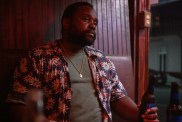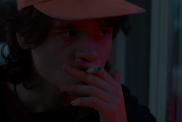One wouldn’t think a movie about Muslim extremists plotting terrorist activities in London could possibly be something to laugh about, but what makes the situation so funny in Chris Morris’ Four Lions is how incompetent these radical Islamists can be as their every foible is captured in mockumentary style.
With a similar tone to last year’s In the Loop, it follows a group of young British Muslims led by Omar (Riz Ahmed) who is upset by the treatment of Muslims around the world and decides to do something about it along with his dim-witted friend Waj (Kayvan Novak). The duo travel to Pakistan for training, but return to England with their tail between their legs when they screw that up, and join together with Nigel Lindsay’s Barry, a white Islamic convert who has joined the cell for his own reasons, but doesn’t have the sense to accomplish any of the crazy plans he tries to convince the others to undertake.
Along with two others, the group plots to blow themselves up in the middle of the London Marathon, but as things go wrong, you’ll find yourself laughing at their antics as hard as you may try not to.
Chris Morris is a 20-year veteran of British television, having teamed with Steve Coogan and In the Loop‘s Armando Iannucci for the mock news show “The Day Today” before developing his own acclaimed series “Brass Eye.”
ComingSoon.net got on the phone with Morris before he began his nationwide screening tour for the movie, which culminates in three screenings in New York City tonight and tomorrow.
ComingSoon.net: Obviously, you’ve done a lot of television and satirized politics and the news and the movie incorporates some of that, but it really gets to the point by dealing with something covered in the news and politics, which is terrorists and extremist Muslims. So what got the ball rolling to make this movie?
Chris Morris: Well, I was just reading around, and I think I got to a point where I was reading a story in a serious book about the formation of Al-Qaeda and the history of radical Islam in the context of Islamic culture generally, and I got to a bit where these Yemeni guys were planning to ram a battleship that was moored out at sea and they were going to do it with an exploding launch, so they got down to the seaside at three in the morning, they put the launch in the water and they filled it with explosives and it sank, and I thought, “Right, so there’s five guys there looking at a sunken launch,” and I was wondering who was going to speak first and what do they say and I suddenly realized I was looking at a reaction shot in a farce. I just did that and carried on. By two months later, it had sort just become a tic that wherever I was reading, whether I was reading about the Hamburg cell planning 9/11 or reading about guys fighting in Bosnia in the ’90s or training in Afghanistan to fight the Russians or whatever it was, there was just constant anecdotal evidence that suggested that silly things happened all along the way, but then I went to a court case which lasted eight months and contained telephone directories full of surveillance material which brought this to life in a very three-dimensional way, because you had seven guys in a dock who had been to Pakistan and they’d been recorded talking about anything. Talking about Johnny Depp, talking about bin Laden, talking about how motorcycles are better than cars, talking about their dreams, and also talking about the fact they had 600 kilos of fertilizer in a lock-up and what they were going to do with it, and how they were going to turn it into a bomb. The only problem is that they had forgotten how to make it into a bomb, so they had to phone back Pakistan to get the instructions again, at which point, suspicions were aroused, not least among the Pakistanis on the other end. And so, it came up as this rather low-level bumbling incompetence married with a very British upbringing. Some of these guys played cricket for their schools and had been model pupils. They were very British lads who were buying into a kind of cosmic dream, and (chuckles) dragging their heels firmly along the ground as they attempted to take off.
CS: We generally only hear about the terrorist plans that work. We don’t really hear so much about the other stuff except for when the government says “Don’t bring liquids anymore because we caught someone.” But I don’t think we hear much about things like this where the plans fail so badly that it’s actually kind of amusing.
Morris: There is a guy who attempted the World Trade Center bombing in 1993, Ramzi Yousef. He’d already notched up a bit of farce himself by blowing up some bomb he was making on his workbench. Khalid Sheikh Mohammed, who planned the 9/11 attacks, previously was based in Indonesia and planned what he called the “Bojinka Plot,” the plans for which were intercepted by American intelligence I think in 1994, but he also racked up some fairly bizarre, not to say funny, behavior, trying to impress women by hiring planes and flying them past their office blocks and stuff, just fairly extravagant, a bit Carlos the Jackal style. Freelance, maverick, slightly larger than life behavior, and so it started to feel not just not strange, but actually part of the picture. I thought if you tell a story about this side of it, it really opens things up.

CS: You had done stuff with Channel 4 before but how hard it convincing others to get on board once you had the idea. Did you have to just write it out and then give the script to people to convince them to make the movie?
Morris: No, I actually fell foul of the rather lucky relationship I had with Channel 4, which is to say that over the years, we’ve evolved a system where they’d say, “Are you ready to tell us what you’re working on?” and I’d say, “Not quite” and then I’d go in and say, “This is what I’m working on,” and they’d say, “Great, alright, when can you deliver that?” And I had one of those conversations related to this and then somebody further down the line went bonkers, and said–I have have to say that in the fullness of their ignorance–“I’m not going to get firebombed for this.” And I said, “You’re absolutely right, you’re not going to get firebombed for this.” But his inflection and my inflection differed. (laughs) No, we sort of had this kind of… it was difficult, it was protracted, but they found a way in the end, and on we went.
CS: Were you ever considering it as a possible TV show or TV movie or was it always planned as a feature-length film?
Morris: It wasn’t a TV show. It was always going to be a film but what exactly how the film was going to be mediated, because there’s a very gray area now between what is a film and what is a TV feature. Certainly here, you have pieces that are made as one and then put out as another, so for example, there was thing called “The Road to Guantanamo” that was made for Channel 4, did you see that?
CS: I actually did and I also saw the other show Michael Winterbottom made that’s going to be released as a feature film here, it’s called “The Trip” with Steve Coogan and Rob Brydon doing their trip through Northern England.
Morris: Fine, so there’s a very good example. It’s in a sort of inter-land and really, you could have called it either way, and they do something that you can do both, because actually, “Road to Guantanamo” did both and it happens the other way as is what happened with this. This was made for cinema but through the nature of the contracts, within two years of it being released on the screen, it’s then showed on Channel 4, so it was always going to be that shapethree-act structure, 90 minutes.
CS: These characters have enough life that I could see it easily being turned into a 6 half-hour TV show that ends how it ends.
Morris: Yeah, you could. I guess you could have done that, you could have done it in three hours. I was loathe to make the thing last longer than it seemed to want to last. I think you’d end up ramming too much into it, but that’s just a choice we made.
CS: I want to ask about the cast because I assume these were some Muslim comics from England who were in on the joke and what you were trying to do, but I found out that these are serious actors, including one that’s trained in Shakespeare. So how did you find them and convince them to do this? Did most of them get the joke right away?
Morris: Well, I mean, so you’re talking about Nigel Lindsay who plays Barry. I’ve known him on and off over the past 15 years and we had worked together before briefly once or twice, so he was a case of we were struggling to find somebody who could get the required menace of Barry but also be ridiculous, and Nigel just came in. I thought I’d get him in for an audition, we played around with scripted scenes, and he just chipped the notes perfectly. On the very first read, he just got the combination of heat and self-undermining ridicule, so he was great. It didn’t matter much to me whether somebody came from a comedic background or an acting background. He’s a comic actor, Kayvan (Novak) is a comedian but it turned out that they both went to the same drama school at different times. It was a case of seeing a lot of people. We saw hundreds of people, because you’ve got to find people who are good enough actors to carry the notes all the way through, and basically to make the part real, but also are capable of delivering jokes and making scenes funny, and that’s an extra almost undefinable quality that they have. We had a lot of people do straight reads for Barry who were brilliant, but they just didn’t make me laugh. I was patient, though. I knew we’d get there, and when the right person turned up, it was obvious pretty much as soon as they opened their mouth. I couldn’t be more pleased with the people we ended up with, and in terms of persuading them, yeah, you have to have a conversation in which they realize you’re serious and you’re not merely d*cking around with the subject in order to call attention to yourself. It’s the easiest subject in the world to cause outrage with, it’s even easier than pedophilia, and I’ve tried that… I haven’t tried pedophilia, I’ve done a program about it, so that would be something that you could if you had fewer brain cells than a mollusk, but once they realized that wasn’t what it was about, that’s actually what sorted them out, they wouldn’t have come in for the audition if they thought it was about that. It’s just a case of reassuring people this is properly thought through.

CS: I’ve talked to a number of Middle Eastern actors before who do want to work but they’re cautious about the roles they play and it depends on the script and the director, and they’re often nervous about playing the typical Middle Eastern terrorist, and I wondered if you encountered any of that.
Morris: What, who just thought, “No, I don’t want to play another terrorist”?
CS: Not even just that but doing something that pokes light that they might have to contend with on a serious level.
Morris: Yeah, I mean not least Riz who plays Omar, who was aware, unlike I was, that he would have to face questions from his Muslim friends, his cousins, his family, saying, “Right, what do you think you were doing?” As it turns out–and I talked him through that–well, because I had to (laughs) and I didn’t have to say anything disingenuous to persuade him. I did take the trouble to go through it with him, because he asked me. We had a conversation and he asked some really good questions, we talked it through, and we got to a point where we were seeing it from the same position, and I certainly didn’t want to gloss over that, because I knew that it would mean something. It would mean that it would be real for him, and it’s like that for all of them. Adeel who plays Faisal and Arsher who plays Hassan, those are the Muslim guys, and then the guy who plays Ahmed was also aware that he would have to have discussions with his friends so there was no way we were going to be closed about that.
CS: I also wanted to ask about working with Jesse Armstrong and Sam Bain (co-writers) and how you brought them on board.
Morris: I knew them a bit anyway, and greatly admired the work they did together and separately, so when this came up, once I started to get excited about the idea, I had an early rather excited conversation with Jesse in which we talked mainly about secret agents in terms of fictions about terrorists, but underpinned by the idea that I wanted to do a comedy about British Jihadi. I kind of told him of the things that I had come across thus far, and we pretty rapidly, after two or three meetings quickly we realized that we were all seeing very strongly that there was comedy potential here to write a comic fiction about it, so off we went, and I was extremely happy and lucky, I felt, to be working with guys who were so good on character and particularly men with shortcomings.
CS: I wanted to ask about shooting some of the things in the movie on the streets without having them think you were actually Muslim terrorists planning something.
Morris: Ah, well, I mean, because we were all dressed up in funny costumes mainly, but when we were filming the bit with the crow in the fields, I think there were two or three calls to the local police–because we were filming on relatively long lenses so we were hidden–and there were reports locally of a man who seemed to be wearing traditional Pakistani dress who seemed to be talking to a bird and behaving in a strange way, and creating explosions. So there was the odd incident. I’d say there wasn’t a world-busting event, but I think we took reasonable precautions. We had signs saying, “Look over there” and then we’d do something the other way.
CS: What about creating the marathon? Was that something you created for the movie or did you actually film guerilla-style at an actual marathon?
Morris: Both really. I went down in 2008 and filmed some shots of the actual London Marathon, and then we sort of parachuted into the Sheffield Half-Marathon and we ran a section of it right at the start with 50 extras, forming a sort of human island around our hero costumes, the Honey Monster and the Wookie, and we ran the action with our floating island of people first in the actual marathon itself and then as a series of pick-ups, so we just built progressively. I knew where I’d shot the material from in the London Marathon, so I just drew maps and storyboards which recreated the sort of angles that we shot from and the positions that I wanted to make the cuts, so I created a fictional map of what the film was going to show in terms of the sniper positions and we just sort of built that backwards.
CS: I was really impressed with how the movie started rather small and then just got really big by the end.
Morris: Well, I’m glad you enjoyed that. We were sort of high-bound by reality in terms of small start, because the number of times I just hunt out with guys in small rooms and cars, just sitting around talking, talking, talking, talking (laughs)… in places which I guess you would describe as “not exactly panoramic,” and then once or twice you get a nice Northern vista, but I was pleased that we were going to be up mountains and see scenes in Pakistan and some at the London Marathon, too.

CS: I do want to ask about some of the technical aspects, especially the casting, but obviously this film has played a lot of festivals around the world and I was curious about the reaction audiences have to it. Do they generally know what to expect going in or are there audiences who just go in thinking “This looks interesting” but not knowing much about it?
Morris: Well, I think film festivals tend to have pretty well-informed audiences… pretty well-informed or pretty juiced-up or something. At least every film festival I’ve seen it play at, people have come to it and people have welcomed the idea of it before the film started, so when it starts, they’re just off. There’s a different way that people respond to it. At South by Southwest in Austin earlier this year, they sort of blew the roof off in terms of their response. I mean, it was really the most unqualifiedly high-octane response I’ve seen and it went down just was well in a slightly different tone of appreciation in the Czech Republic, where they particularly enjoyed any gag to do with surveillance, because they’re 20 years on from a strictly-surveiled society themselves. I think the Australians enjoyed anything with an explosion and loud noises (laughs) so it kind of depends where you are, but film festivals tend to hype people’s expectations up pretty well, so I think you’d be pretty unlucky to play at a film festival where people were, shall I say, muted or nonplussed.
CS: I feel that some people who attend film festivals just see what tickets are available at the time they can see a movie and don’t know what to expect so I wondered if people were very shocked if they didn’t know about it beforehand. I guess they did the research, like you said.
Morris: Yeah, I think that people sometimes wonder… I dunno. Look, we made sure that it was funny all the way from beginning to end–we hope, that was our plan–but it wasn’t just going to be that. There obviously was going to be sort of twists and talk beneath the surfaces, and we also knew that to be able to make it properly interesting, you would have to engage with the characters, and that’s what made me realize that it was going to be a film and not much else. I think we wanted people to enjoy it – it’s a good night out, it’s fun, you laugh, but maybe you take something away as well.
Four Lions opens on Friday, November 5, in select cities, but if you live in the New York area, you can catch a few promo screenings with Chris in attendance to answer questions tonight and tomorrow night, November 3 and 4. Tonight, Chris will be at the BAM Cinématek in Brooklyn at 6:50pm and the Jackson Heights Cinema in Queens at 10pm then back in Brooklyn, then on Thursday night he’s back in Brooklyn at the ReRun Gastropub at 10PM. You can find RSVP instructions at the official site.









